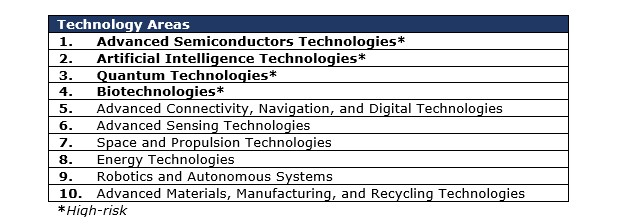On October 3, 2023, the European Commission ("Commission") unveiled a list of 10 technology areas qualified as "critical" to the European Union's ("EU") economic security, out of which four (Semiconductors, AI, Quantum Technologies, and Biotechnologies) are considered as highly likely to present the most sensitive and immediate risks related to Europe's technology security and technology leakage.
This is the latest installment in the EU's rollout of policies and regulations aimed at safeguarding Europe's economic security. It builds on work already started at the European level, such as frameworks to develop a domestic EU semiconductor industry (see our March 2022 Commentary on the EU Chips Act) and addresses security risks related to 5G infrastructure (see our May 2020 White Paper on the EU 5G Toolbox).
The List (available here) is the following:

The four high-risk technologies will be subject to a targeted assessment of risks by year-end, and the others could be subject to risk assessments in 2024. The purpose is to identify vulnerabilities of a systemic nature according to their potential impact on the EU's economic security and the degree of likelihood that such negative impact materializes. These risk assessments may then lead to changes in the enforcement, or the revision of, existing EU or Member States-level instruments.
In the short-term, the List will likely have the most impact on foreign investors eyeing EU targets that are involved in the listed technologies. Such investors should expect deeper scrutiny over current and future transactions covered by the EU's foreign subsidies regulation (see our December 2022 Alert on the EU foreign subsidies regulation), or Member States' foreign direct investment ("FDI") screening mechanisms. The List notably coincides with the ongoing evaluation of the EU's FDI regulation. A proposed revision is expected before the end of 2023. To date, 21 EU Member States have FDI screening mechanisms in place, requiring pre-transaction approval of certain acquisitions in EU targets whose activities qualify as critical.
The risk assessments may also lead to new initiatives that could further restrict access to the EU market (like for 5G infrastructure, under the AI Act, or under the EU cloud certification scheme) and broaden export and investments controls. In that regard, the Commission has already announced it will examine the possibility of controlling outbound investments, echoing similar initiatives on the other side of the Atlantic (as detailed in our August 2023 Alert on the Biden administration's recent outbound investment executive order).